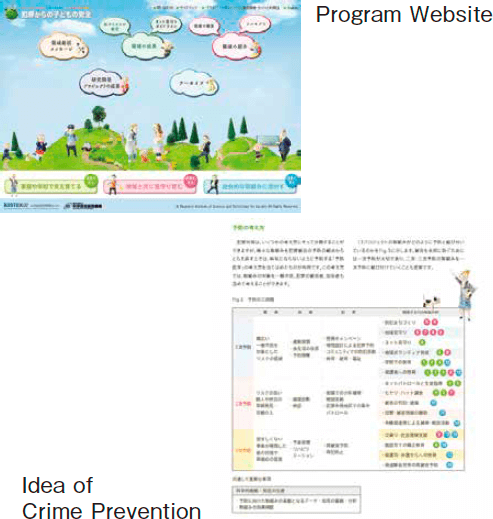As is evident from social problems such as suicides caused by abuse and bullying, protecting children from crime is an urgent issue in today’s Japan. It is not an issue only for guardians and the police any more. We believe the following are important to protect children from crime : a) children should be protected and nurtured by all of society; b) various initiatives should be linked to prevent children becoming the victims of crime; and c) the problem should be considered from the standpoint of human, material, and social systems. (Activities ended in March 2013)
Program Supervisor

KATAYAMA Tsuneo
Professor, Tokyo Denki University(as of the completion of the R&D Focus Area)
As our society changes, the environment in which children grow up continues to change dramatically as well. Efforts to protect children in the community from criminal activities are being undertaken by the national government as well as by families, schools, local residents, local governments, NPOs, private sector companies and so on.
However, many of those involved have pointed out that at present, only isolated efforts on a trial-and-error basis have been made in this area, and many of them are ineffective.
For this reason, in 2007 RISTEX set up a new R&D Focus Area titled"Protecting Children from Crime."This R&D Focus Area supports outstanding projects where stakeholders will work together to resolve relative problems in order to incorporate scientific knowledge and methods into crime prevention policies. In addition, a network open to all related entities is being constructed to ensure that the efforts are effective and beneficial to society in future as well as today.
Goals
- To create an open network to facilitate information sharing and collaboration among relevant parties, including researchers who can provide a scientific knowledge and people who face problems in their work to protect children from crime.
- To develop scientific knowledge and methods that will form the basis for crime prevention policies, ensuring that the importance of evidence-based crime prevention efforts is recognized in Japan, and provide an opportunity to implement these efforts.
- To produce solid outcomes (policy recommendations, experimental proof etc.) from the application of scientific knowledge and methods in efforts to reduce the risk that children will become victims of crime. The design of such case studies should be characterized by consistency with and relevance to the actual conditions of particular communities.
In promoting R&D, consideration will be given to ensuring that important values such as "dependable interpersonal relationships" and the "healthy growth of mind and body in children" are not adversely affected, and that efforts are conducted jointly by many people with diverse interests and viewpoints.
R&D Program: Protecting Children from Crime (FY2007-2012)
- To fund and support R&D projects (of 1-5yrs. in duration) that are designed to pursue Goal [2] and/or Goal [3]
- To fund and support project planning efforts for those with potential toreceive full-funding in the future by providing opportunities to develop feasible schedules, management structures and other details
Summary of R&D Focus Area - Outcomes and recommendations
In order to recognize and disseminate crime prevention initiatives in Japan based on scientific evidence, to reduce the risk of crime against children, and to take proactive measures so that children would not become crime victims, we promoted thirteen projects over a period of six years, establishing the following three objectives: to develop scientific knowledge and methods; to produce specific results that would match the local circumstances; and, to that end, to build networks of people and researchers dealing with practical issues in regions, schools, and government authorities. We held a number of symposiums to raise and clarify problems extending beyond the initiatives and results of individual projects. Finally, we summarized what cannot be solved through the efforts of individual researchers and a single funding agency in the form of "Seven Recommendations.” We are confident that they will serve as guidelines when proposing and designing new initiatives and policies.
Seven recommendations for protecting children from crime are:
- Protect and nurture children through the collaboration of all stakeholders,
- Aim for sustained initiatives based on actual circumstances and evidence,
- Capture the voices of children, turn them into data, and use for prevention,
- Share data and create frameworks to be used by individual initiatives,
- Understand criminal phenomena and foster capabilities that help in crime prevention,
- Promote R&D and implementation that contributes to crime prevention, and
- Understand local needs and communicate research outcomes with society.
■The outcomes are disclosed on the website.
Program activities ended at the end of FY2012, but not all problems have been resolved. It is no exaggeration to say that it has just begun to return the project outcomes to society and to deploy them further.
Also, new problems will surely show up now and in the future. To let you know our initiatives and outcomes so far, therefore, we renewed the “Children’s Safety from Crime” website.
The program’s outcomes, e.g. the entire text of the “7 Suggestions on Protecting Children from Crime,” and the outcomes of 13 projects, are summarized in an easy-to-understand manner. In addition to the specific outcomes of each project, voices of the co-workers who kindly actually utilized the outcomes and the idea of crime prevention, etc., as well, are introduced. Also, there is a link to the project’s own website for your perusal.

R&D Projects
FY2009
|
Proposal of "Agencies Linkage" Model for Protecting Children against Crimes |
2009.10-2012.3 |
|---|---|
|
An Educational Program to Promote Children's Interpersonal-relationship Competence for Crime Prevention |
2009.10-2012.9 |
|
Establishment of Supporting Regional Systems for Children: Prevention of Victimization and Criminal Offenses |
2009.10-2012.9 |
|
A Study on the Extraction and Monitoring Methods of Harmful Information for Children on the Bulletin Board System |
2009.10-2011.3 |
|
Research on the Construction of a Crime Prevention Network in the Local Community through Theatre Workshop |
2009.10-2012.9 |
FY2008
|
Development of Civil Instructor Support System for Website Use by Children |
2008.10-2012.9 |
|---|---|
|
Training Program for Video Recorded Interview with Children in Forensic Contest |
2008.10-2012.9 |
|
Development of Advanced Information Technology and Applications for Intentional Injury Prevention |
2008.10-2012.9 |
|
Development of Support Systems for Community Safety Planning |
2008.10-2012.9 |
FY2007
|
HEART RENAISSANCE: Development of Safety Networks for Children in Our Society through Technology and Human Relationships |
2007.10-2011.3 |
|---|---|
|
Research and Development (R&D) Project for Learning Systems in Crime Prevention |
2007.10-2011.3 |
|
Establishing an Empirical Basis to Measure and Prevent Crimes against Children |
2007.10-2011.9 |
|
Development of e-Learning System for the Safety of Children against Crimes |
2007.10-2012.9 |